formerly eScholarship Editions


|
|
|
|
Your request for similar items found 20 book(s). | Modify Search | Displaying 1 - 20 of 20 book(s) | |
| 1. | 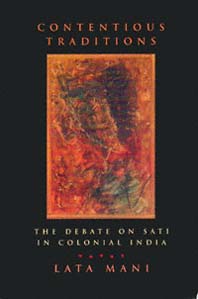 | Title: Contentious traditions: the debate on Sati in colonial India Author: Mani, Lata 1956- Published: University of California Press, 1998 Subjects: History | South Asia | Postcolonial Studies Publisher's Description: Contentious Traditions analyzes the debate on sati , or widow burning, in colonial India. Though the prohibition of widow burning in 1829 was heralded as a key step forward for women's emancipation in modern India, Lata Mani argues that the women who were burned were marginal to the debate and that the controversy was over definitions of Hindu tradition, the place of ritual in religious worship, the civilizing missions of colonialism and evangelism, and the proper role of the colonial state. Mani radically revises colonialist as well as nationalist historiography on the social reform of women's status in the colonial period and clarifies the complex and contradictory character of missionary writings on India.The history of widow burning is one of paradox. While the chief players in the debate argued over the religious basis of sati and the fine points of scriptural interpretation, the testimonials of women at the funeral pyres consistently addressed the material hardships and societal expectations attached to widowhood. And although historiography has traditionally emphasized the colonial horror of sati , a fascinated ambivalence toward the practice suffused official discussions. The debate normalized the violence of sati and supported the misconception that it was a voluntary act of wifely devotion.Mani brilliantly illustrates how situated feminism and discourse analysis compel a rewriting of history, thus destabilizing the ways we are accustomed to look at women and men, at "tradition," custom, and modernity. [brief] Similar Items |
| 2. | 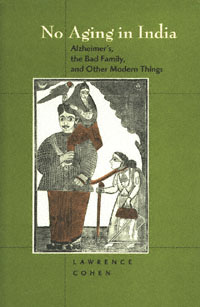 | Title: No aging in India: Alzheimer's, the bad family, and other modern things Author: Cohen, Lawrence 1961- Published: University of California Press, 1998 Subjects: Anthropology | Medical Anthropology | Aging | South Asia Publisher's Description: From the opening sequence, in which mid-nineteenth-century Indian fishermen hear the possibility of redemption in an old woman's madness, No Aging in India captures the reader with its interplay of story and analysis. Drawing on more than a decade of ethnographic work, Lawrence Cohen links a detailed investigation of mind and body in old age in four neighborhoods of the Indian city of Varanasi (Banaras) with events and processes around India and around the world. This compelling exploration of senility - encompassing not only the aging body but also larger cultural anxieties - combines insights from medical anthropology, psychoanalysis, and postcolonial studies. Bridging literary genres as well as geographic spaces, Cohen responds to what he sees as the impoverishment of both North American and Indian gerontologies - the one mired in ambivalence toward demented old bodies, the other insistent on a dubious morality tale of modern families breaking up and abandoning their elderly. He shifts our attention irresistibly toward how old age comes to matter in the constitution of societies and their narratives of identity and history. [brief] Similar Items |
| 3. | 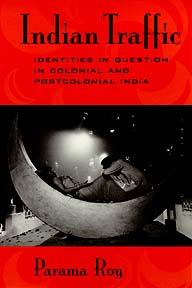 | Title: Indian traffic: identities in question in colonial and postcolonial India Author: Roy, Parama Published: University of California Press, 1998 Subjects: Postcolonial Studies | Literary Theory and Criticism | South Asia | Gender Studies Publisher's Description: The continual, unpredictable, and often violent "traffic" between identities in colonial and postcolonial India is the focus of Parama Roy's stimulating and original book. Mimicry has been commonly recognized as an important colonial model of bourgeois/elite subject formation, and Roy examines its place in the exchanges between South Asian and British, Hindu and Muslim, female and male, and subaltern and elite actors. Roy draws on a variety of sources - religious texts, novels, travelogues, colonial archival documents, and films - making her book genuinely interdisciplinary. She explores the ways in which questions of originality and impersonation function, not just for "western" or "westernized" subjects, but across a range of identities. For example, Roy considers the Englishman's fascination with "going native," an Irishwoman's assumption of Hindu feminine celibacy, Gandhi's impersonation of femininity, and a Muslim actress's emulation of a Hindu/Indian mother goddess. Familiar works by Richard Burton and Kipling are given fresh treatment, as are topics such as the "muscular Hinduism" of Swami Vivekananda. Indian Traffic demonstrates that questions of originality and impersonation are in the forefront of both the colonial and the nationalist discourses of South Asia and are central to the conceptual identity of South Asian postcolonial theory itself. [brief] Similar Items |
| 4. |  | Title: India Author: Wolpert, Stanley A 1927- Published: University of California Press, 1990 Subjects: History | South Asia | Asian History Publisher's Description: The history of India is the engrossing story of an ancient civilization, reborn as a modern nation. More a continent than a single nation, India is home to over one-fifth of humanity, yet it remains a mystery to most non-Indians, barely appreciated and poorly understood. Stanley Wolpert's India provides a much-needed, concise overview of Indian history and culture. His new preface brings the book up to date, discussing national elections, the economic effects of the new globalization, and the consequences of joining the nuclear arms race. [brief] Similar Items |
| 5. | 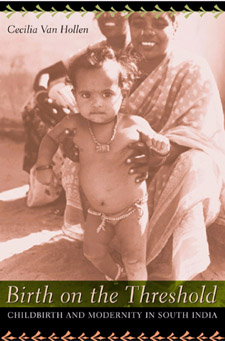 | Title: Birth on the threshold: childbirth and modernity in South India Author: Van Hollen, Cecilia Coale Published: University of California Press, 2003 Subjects: Anthropology | Cultural Anthropology | Medical Anthropology | Sociology | Gender Studies | Hinduism | South Asia | Asian Studies | South Asia | South Asia Publisher's Description: Even childbirth is affected by globalization - and in India, as elsewhere, the trend is away from home births, assisted by midwives, toward hospital births with increasing reliance on new technologies. And yet, as this work of critical feminist ethnography clearly demonstrates, the global spread of biomedical models of childbirth has not brought forth one monolithic form of "modern birth." Focusing on the birth experiences of lower-class women in the South Indian state of Tamil Nadu, Birth on the Threshold reveals the complex and unique ways in which modernity emerges in local contexts. Through vivid description and animated dialogue, this book conveys the birth stories of the women of Tamil Nadu in their own voices, emphasizing their critiques of and aspirations for modern births today. In light of these stories, author Cecilia Van Hollen explores larger questions about how the structures of colonialism and postcolonial international and national development have helped to shape the form and meaning of birth for Indian women today. Ultimately, her book poses the question: How is gender - especially maternity - reconfigured as birth is transformed? [brief] Similar Items |
| 6. | 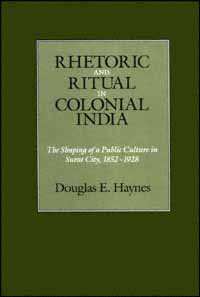 | Title: Rhetoric and ritual in colonial India: the shaping of a public culture in Surat City, 1852-1928 Author: Haynes, Douglas E Published: University of California Press, 1991 Subjects: History | Asian History | South Asia | Cultural Anthropology Publisher's Description: This book explores the rhetoric and ritual of Indian elites undercolonialism, focusing on the city of Surat in the Bombay Presidency. It particularly examines how local elites appropriated and modified the liberal representative discourse of Britain and thus fashioned a "public' culture that excluded the city's underclasses. Departing from traditional explanations that have seen this process as resulting from English education or radical transformations in society, Haynes emphasizes the importance of the unequal power relationship between the British and those Indians who struggled for political influence and justice within the colonial framework. A major contribution of the book is Haynes' analysis of the emergence and ultimate failure of Ghandian cultural meanings in Indian politics after 1923.The book addresses issues of importance to historians and anthropologists of India, to political scientists seeking to understand the origins of democracy in the "Third World," and general readers interested in comprehending processes of cultural change in colonial contexts. [brief] Similar Items |
| 7. | 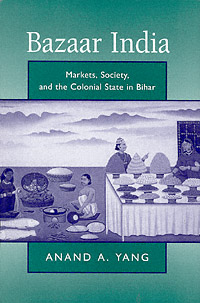 | Title: Bazaar India: markets, society, and the colonial state in Gangetic Bihar Author: Yang, Anand A Published: University of California Press, 1999 Subjects: Asian Studies | South Asia | Asian History | Economics and Business Publisher's Description: The role of markets in linking local communities to larger networks of commerce, culture, and political power is the central element in Anand A. Yang's provocative and original study. Yang uses bazaars in the northeast Indian state of Bihar during the colonial period as the site of his investigation. The bazaar provides a distinctive locale for posing fundamental questions regarding indigenous societies under colonialism and for highlighting less familiar aspects of colonial India.At one level, Yang reconstructs Bihar's marketing system, from its central place in the city of Patna down to the lowest rung of the periodic markets. But he also concentrates on the dynamics of exchanges and negotiations between different groups and on what can be learned through the "voices" of people in the bazaar: landholders, peasants, traders, and merchants. Along the way, Yang uncovers a wealth of details on the functioning of rural trade, markets, fairs, and pilgrimages in Bihar.A key contribution of Bazaar India is its many-stranded narrative history of some of South Asia's primary actors over the past two centuries. But Yang's approach is not that of a detached observer; rather, his own voice is engaged with the voices of the past and with present-day historians. By focusing on the world beyond the mud walls of the village, he widens the imaginative geography of South Asian history. Readers with an interest in markets, social history, culture, colonialism, British India, and historiographic methods will welcome his book. [brief] Similar Items |
| 8. | 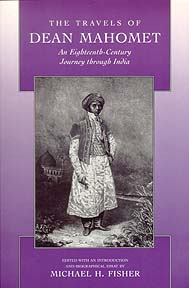 | Title: The travels of Dean Mahomet: an eighteenth-Century journey through India Author: Mahomet, Sake Deen 1759-1851 Published: University of California Press, 1997 Subjects: History | Asian History | South Asia | Travel | Autobiographies and Biographies Publisher's Description: This unusual study combines two books in one: the 1794 autobiographical travel narrative of an Indian, Dean Mahomet, recalling his years as camp-follower, servant, and subaltern officer in the East India Company's army (1769 to 1784); and Michael H. Fisher's portrayal of Mahomet's sojourn as an insider/outsider in India, Ireland, and England. Emigrating to Britain and living there for over half a century, Mahomet started what was probably the first Indian restaurant in England and then enjoyed a distinguished career as a practitioner of "oriental" medicine, i.e., therapeutic massage and herbal steam bath, in London and the seaside resort of Brighton. This is a fascinating account of life in late eighteenth-century India - the first book written in English by an Indian - framed by a mini-biography of a remarkably versatile entrepreneur. Travels presents an Indian's view of the British conquest of India and conveys the vital role taken by Indians in the colonial process, especially as they negotiated relations with Britons both in the colonial periphery and the imperial metropole.Connoisseurs of unusual travel narratives, historians of England, Ireland, and British India, as well as literary scholars of autobiography and colonial discourse will find much in this book. But it also offers an engaging biography of a resourceful, multidimensional individual. [brief] Similar Items |
| 9. |  | Title: The corporate practice of medicine: competition and innovation in health care Author: Robinson, James C 1953- Published: University of California Press, 1999 Subjects: Politics | Public Policy | Medicine | Economics and Business Publisher's Description: One of the country's leading health economists presents a provocative analysis of the transformation of American medicine from a system of professional dominance to an industry under corporate control. James Robinson examines the economic and political forces that have eroded the traditional medical system of solo practice and fee-for-service insurance, hindered governmental regulation, and invited the market competition and organizational innovations that now are under way. The trend toward health care corporatization is irreversible, he says, and it parallels analogous trends toward privatization in the world economy.The physician is the key figure in health care, and how physicians are organized is central to the health care system, says Robinson. He focuses on four forms of physician organization to illustrate how external pressures have led to health care innovations: multispecialty medical groups, Independent Practice Associations (IPAs), physician practice management firms, and physician-hospital organizations. These physician organizations have evolved in the past two decades by adopting from the larger corporate sector similar forms of ownership, governance, finance, compensation, and marketing.In applying economic principles to the maelstrom of health care, Robinson highlights the similarities between competition and consolidation in medicine and in other sectors of the economy. He points to hidden costs in fee-for-service medicine - overtreatment, rampant inflation, uncritical professional dominance regarding treatment decisions - factors often overlooked when newer organizational models are criticized.Not everyone will share Robinson's appreciation for market competition and corporate organization in American health care, but he challenges those who would return to the inefficient and inequitable era of medicine from which we've just emerged. Forcefully written and thoroughly documented, The Corporate Practice of Medicine presents a thoughtful - and optimistic - view of a future health care system, one in which physician entrepreneurship is a dynamic component. [brief] Similar Items |
| 10. | 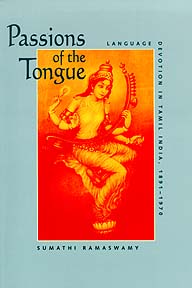 | Title: Passions of the tongue: language devotion in Tamil India, 1891-1970 Author: Ramaswamy, Sumathi Published: University of California Press, 1997 Subjects: Asian Studies | History | South Asia | Language and Linguistics | Asian History | Asian Literature Publisher's Description: Why would love for their language lead several men in southern India to burn themselves alive in its name? Passions of the Tongue analyzes the discourses of love, labor, and life that transformed Tamil into an object of such passionate attachment, producing in the process one of modern India's most intense movements for linguistic revival and separatism. Sumathi Ramaswamy suggests that these discourses cannot be contained within a singular metanarrative of linguistic nationalism and instead proposes a new analytic, "language devotion." She uses this concept to track the many ways in which Tamil was imagined by its speakers and connects these multiple imaginings to their experience of colonial and post-colonial modernity. Focusing in particular on the transformation of the language into a goddess, mother, and maiden, Ramaswamy explores the pious, filial, and erotic aspects of Tamil devotion. She considers why, as its speakers sought political and social empowerment, metaphors of motherhood eventually came to dominate representations of the language. [brief] Similar Items |
| 11. | 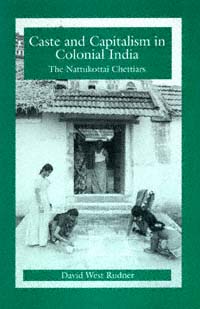 | Title: Caste and capitalism in colonial India: the Nattukottai Chettiars Author: Rudner, David West Published: University of California Press, 1994 Subjects: Anthropology | Cultural Anthropology | South Asia | Asian History Publisher's Description: David Rudner's richly detailed ethnographic and historical analysis of a South Indian merchant-banking caste provides the first comprehensive analysis of the interdependence among Indian business practice, social organization, and religion. Exploring noncapitalist economic formations and the impact of colonial rule on indigenous commercial systems, Rudner argues that caste and commerce are inextricably linked through formal and informal institutions. The practices crucial to the formation and distribution of capital are also a part of this linkage. Rudner challenges the widely held assumptions that all castes are organized either by marriage alliance or status hierarchy and that caste structures are incompatible with the "rational" conduct of business. [brief] Similar Items |
| 12. | 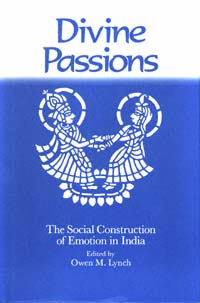 | Title: Divine passions: the social construction of emotion in India Author: Lynch, Owen M 1931- Published: University of California Press, 1990 Subjects: Anthropology | South Asia | History Publisher's Description: Naked holy men denying sexuality and feeling; elderly people basking in the warmth and security provided by devoted and attentive family members; fastidious priests concerned solely with rules of purity and minutiae of ritual practice; puritanical moralists concealing women and sexuality behind purdah's veils - these are familiar Western stereotypes of India. The essays in Divine Passions , however, paint other, more colorful and emotionally alive pictures of India: ecstatic religious devotees rolling in temple dust; gray-haired elders worrying about neglect and mistreatment by family members; priests pursuing a lusty, carefree ideal of the good life; and jokers reviling one another with bawdy, sexual insults at marriages.Drawing on rich ethnographic data from emotion-charged scenarios, these essays question Western academic theories of emotion, particularly those that reduce emotions to physiological sensations or to an individual's private feelings. Presenting an alternative view of emotions as culturally constructed and morally evaluative concepts grounded in the bodily self, the contributors to Divine Passions help dispel some of the West's persistent misconceptions of Indian emotional experience. Moreover, the edition as a whole argues for a new and different understanding of India based on field research and an understanding of the devotional (bhakti) tradition. [brief] Similar Items |
| 13. | 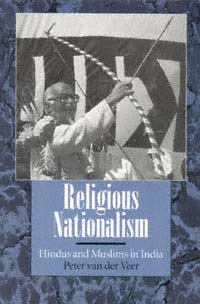 | Title: Religious nationalism: Hindus and Muslims in India Author: Veer, Peter van der Published: University of California Press, 1994 Subjects: Anthropology | Cultural Anthropology | Hinduism | South Asia Publisher's Description: Religious nationalism is a subject of critical importance in much of the world today. Peter van der Veer's timely study on the relationship between religion and politics in India goes well beyond other books on this subject. He brings together several disciplines - anthropology, history, social theory, literary studies - to show how Indian religious identities have been shaped by pilgrimage, migration, language development, and more recently, print and visual media.Van der Veer's central focus is the lengthy dispute over the Babari mosque in Ayodhya, site of a bloody confrontation between Hindus and Muslims in December 1992. A thought-provoking range of other examples describes the historical construction of religious identities: cow protection societies and Sufi tombs, purdah and the political appropriation of images of the female body, Salman Rushdie and the role of the novel in nationalism, Mahatma Gandhi and Swami Vivekananda, the Khalsa movement among Sikhs, and nationalist archaeology and the televised Ramayana .Van der Veer offers a new perspective on the importance of religious organization and the role of ritual in the formation of nationalism. His work advances our understanding of contemporary India while also offering significant theoretical insights into one of the most troubling issues of this century. [brief] Similar Items |
| 14. | 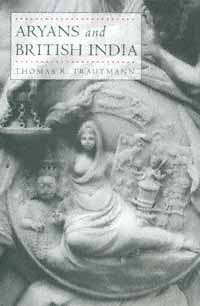 | Title: Aryans and British India Author: Trautmann, Thomas R Published: University of California Press, 1997 Subjects: History | South Asia | Asian History | European History Publisher's Description: "Aryan," a word that today evokes images of racial hatred and atrocity, was first used by Europeans to suggest bonds of kinship, as Thomas Trautmann shows in his far-reaching history of British Orientalism and the ethnology of India. When the historical relationship uniting Sanskrit with the languages of Europe was discovered, it seemed clear that Indians and Britons belonged to the same family. Thus the Indo-European or Aryan idea, based on the principle of linguistic kinship, dominated British ethnological inquiry.In the nineteenth century, however, an emergent biological "race science" attacked the authority of the Orientalists. The spectacle of a dark-skinned people who were evidently civilized challenged Victorian ideas, and race science responded to the enigma of India by redefining the Aryan concept in narrowly "white" racial terms. By the end of the nineteenth century, race science and Orientalism reached a deep and lasting consensus in regard to India, which Trautmann calls "the racial theory of Indian civilization," and which he undermines with his powerful analysis of colonial ethnology in India. His work of reassessing British Orientalism and the Aryan idea will be of great interest to historians, anthropologists, and cultural critics. [brief] Similar Items |
| 15. | 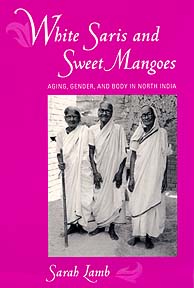 | Title: White saris and sweet mangoes: aging, gender, and body in North India Author: Lamb, Sarah 1960- Published: University of California Press, 2000 Subjects: Anthropology | South Asia | Aging | Cultural Anthropology | Women's Studies Publisher's Description: This rich ethnography explores beliefs and practices surrounding aging in a rural Bengali village. Sarah Lamb focuses on how villagers' visions of aging are tied to the making and unmaking of gendered selves and social relations over a lifetime. Lamb uses a focus on age as a means not only to open up new ways of thinking about South Asian social life, but also to contribute to contemporary theories of gender, the body, and culture, which have been hampered, the book argues, by a static focus on youth. Lamb's own experiences in the village are an integral part of her book and ably convey the cultural particularities of rural Bengali life and Bengali notions of modernity. In exploring ideals of family life and the intricate interrelationships between and within generations, she enables us to understand how people in the village construct, and deconstruct, their lives. At the same time her study extends beyond India to contemporary attitudes about aging in the United States. This accessible and engaging book is about deeply human issues and will appeal not only to specialists in South Asian culture, but to anyone interested in families, aging, gender, religion, and the body. [brief] Similar Items |
| 16. | 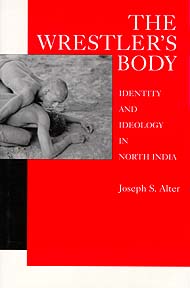 | Title: The wrestler's body: identity and ideology in north India Author: Alter, Joseph S Published: University of California Press, 1992 Subjects: Anthropology | South Asia Publisher's Description: The Wrestler's Body tells the story of a way of life organized in terms of physical self-development. While Indian wrestlers are competitive athletes, they are also moral reformers whose conception of self and society is fundamentally somatic. Using the insights of anthropology, Joseph Alter writes an ethnography of the wrestler's physique that elucidates the somatic structure of the wrestler's identity and ideology.Young men in North India may choose to join an akhara, or gymnasium, where they subject themselves to a complex program of physical and moral fitness. Alter's first-hand description of each detail of the wrestler's regimen offers a unique perspective on South Asian culture and society. Wrestlers feel that moral reform of Indian national character is essential and advocate their way of life as an ideology of national health. Everyone is called on to become a wrestler and build collective strength through self-discipline. [brief] Similar Items |
| 17. | 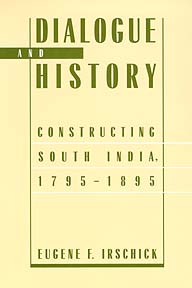 | Title: Dialogue and history: constructing South India, 1795-1895 Author: Irschick, Eugene F Published: University of California Press, 1994 Subjects: History | Asian History | South Asia | Cultural Anthropology Publisher's Description: Eugene Irschick deftly questions the conventional wisdom that knowledge about a colonial culture is unilaterally defined by its rulers. Focusing on nineteenth-century South India, he demonstrates that a society's view of its history results from a "dialogic process" involving all its constituencies.For centuries, agricultural life in South India was semi-nomadic. But when the British took dominion, they sought to stabilize the region by inventing a Tamil "golden age" of sedentary, prosperous villages. Irschick shows that this construction resulted not from overt British manipulation but from an intricate cross-pollination of both European and native ideas. He argues that the Tamil played a critical role in constructing their past and thus shaping their future. And British administrators adapted local customs to their own uses. [brief] Similar Items |
| 18. |  | Title: Lives at risk: public health in nineteenth-century Egypt Author: Kuhnke, LaVerne Published: University of California Press, 1990 Subjects: Anthropology | Medical Anthropology Publisher's Description: Lives at Risk describes the introduction of Western medicine into Egypt. The two major innovations undertaken by Muhammad Ali in the mid-nineteenth century were a Western-style school of medicine and an international Quarantine Board. The ways in which these institutions succeeded and failed will greatly interest historians of medicine and of modern Egypt. And because the author relates her narrative to twentieth-century health issues in developing countries, Lives at Risk will also interest medical and social anthropologists.The presence of the quarantine establishment and the medical school in Egypt resulted in a rudimentary public health service. Paramedical personnel were trained to provide primary health care for the peasant population. A vaccination program effectively freed the nation from smallpox. But the disease-oriented, individual-care practice of medicine derived from the urban hospital model of industrializing Europe was totally incompatible with the health care requirements of a largely rural, agrarian population. [brief] Similar Items |
| 19. | 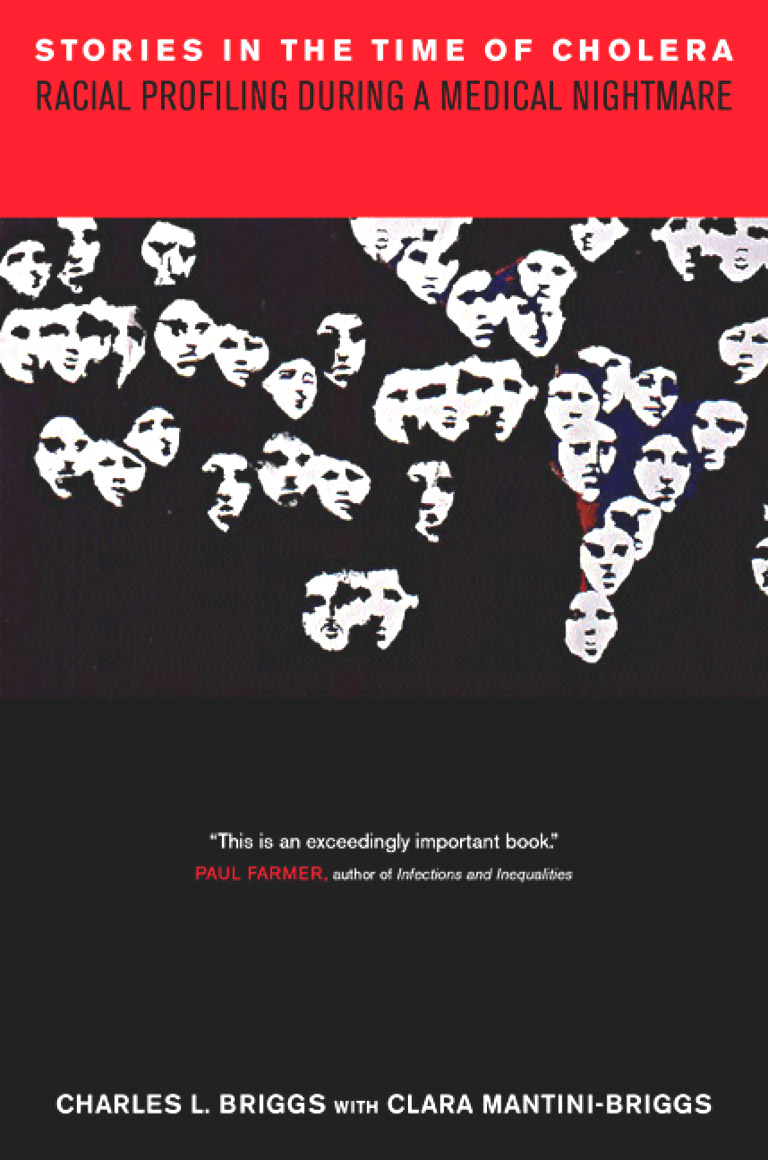 | Title: Stories in the time of cholera: racial profiling during a medical nightmare Author: Briggs, Charles L 1953- Published: University of California Press, 2003 Subjects: Anthropology | Latin American Studies | Ethnic Studies | Disease | Medical Anthropology Publisher's Description: Cholera, although it can kill an adult through dehydration in half a day, is easily treated. Yet in 1992-93, some five hundred people died from cholera in the Orinoco Delta of eastern Venezuela. In some communities, a third of the adults died in a single night, as anthropologist Charles Briggs and Clara Mantini-Briggs, a Venezuelan public health physician, reveal in their frontline report. Why, they ask in this moving and thought-provoking account, did so many die near the end of the twentieth century from a bacterial infection associated with the premodern past? It was evident that the number of deaths resulted not only from inadequacies in medical services but also from the failure of public health officials to inform residents that cholera was likely to arrive. Less evident were the ways that scientists, officials, and politicians connected representations of infectious diseases with images of social inequality. In Venezuela, cholera was racialized as officials used anthropological notions of "culture" in deflecting blame away from their institutions and onto the victims themselves. The disease, the space of the Orinoco Delta, and the "indigenous ethnic group" who suffered cholera all came to seem somehow synonymous. One of the major threats to people's health worldwide is this deadly cycle of passing the blame. Carefully documenting how stigma, stories, and statistics circulate across borders, this first-rate ethnography demonstrates that the process undermines all the efforts of physicians and public health officials and at the same time contributes catastrophically to epidemics not only of cholera but also of tuberculosis, malaria, AIDS, and other killers. The authors have harnessed their own outrage over what took place during the epidemic and its aftermath in order to make clear the political and human stakes involved in the circulation of narratives, resources, and germs. [brief] Similar Items |
| 20. | 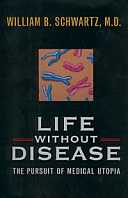 | Title: Life without disease: the pursuit of medical utopia Author: Schwartz, William B 1922- Published: University of California Press, 1998 Subjects: Science | Medicine | Economics and Business | History and Philosophy of Science | Public Policy Publisher's Description: The chaotic state of today's health care is the result of an explosion of effective medical technologies. Rising costs will continue to trouble U.S. health care in the coming decades, but new molecular strategies may eventually contain costs. As life expectancy is dramatically extended by molecular medicine, a growing population of the aged will bring new problems. In the next fifty years genetic intervention will shift the focus of medicine in the United States from repairing the ravages of disease to preventing the onset of disease. Understanding the role of genes in human health, says Dr. William B. Schwartz, is the driving force that will change the direction of medical care, and the age-old dream of life without disease may come close to realization by the middle of the next century. Medical care in 2050 will be vastly more effective, Schwartz maintains, and it may also be less expensive than the resource-intensive procedures such as coronary bypass surgery that medicine relies on today.Schwartz's alluring prospect of a medical utopia raises urgent questions, however. What are the scientific and public policy obstacles that must be overcome if such a goal is to become a reality? Restrictions on access imposed by managed care plans, the corporatization of charitable health care institutions, the increasing numbers of citizens without health insurance, the problems with malpractice insurance, and the threatened Medicare bankruptcy - all are the legacy of medicine's great progress in mastering the human body and society's inability to assimilate that mastery into existing economic, ethical, and legal structures. And if the average American life span is 130 years, a genuine possibility by 2050, what social and economic problems will result?Schwartz examines the forces that have brought us to the current health care state and shows how those same forces will exert themselves in the decades ahead. Focusing on the inextricable link between scientific progress and health policy, he encourages a careful examination of these two forces in order to determine the kind of medical utopia that awaits us. The decisions we make will affect not only our own care, but also the system of care we bequeath to our children. [brief] Similar Items |